|
|
|
Sort Order |
|
|
|
Items / Page
|
|
|
|
|
|
|
| Srl | Item |
| 1 |
ID:
085891
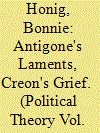

|
|
|
|
|
| Publication |
2009.
|
| Summary/Abstract |
This paper reads Sophocles' Antigone contextually, as an exploration of the politics of lamentation and larger conflicts these stand for. Antigone defies Creon's sovereign decree that her brother Polynices, who attacked the city with a foreign army and died in battle, be dishonoured - left unburied. But the play is not about Polynices' treason. It explores the clash in 5th century Athens between Homeric/ elite and democratic mourning practices. The former (represented by Antigone) memorialize the unique individuality of the dead, focus on the family's loss and bereavement and call for vengeance. The latter (represented by Creon) memorialize the dead's contribution to the immortal polis and emphasize (as in the Funeral Oration) the replaceability of those lost. Each economy of mourning sees the other as excessive and politically unstable. The remainders of both, managed by way of exception institutions such as tragedy and the Dionysian Festival, continue to haunt us now.
|
|
|
|
|
|
|
|
|
|
|
|
|
|
|
|
| 2 |
ID:
085892
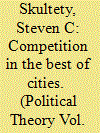

|
|
|
|
|
| Publication |
2009.
|
| Summary/Abstract |
By examining his account of individual virtues, making inferences from his analyses of flawed cities, and teasing out the tacit assumptions behind claims about the nature of political activity, I argue that Aristotle thinks of competition as being a political ideal rather than as an inevitable corruption of civic life. Virtuous citizens compete for civic honor through traditional "competitive outlays" and contend against one another for prestigious offices in the city. Moreover, I argue that the very structure of political deliberation is competitive. It is through a "vis-à-vis" competition among proposals that a winning policy is adopted, and the speakers who offer these proposals are themselves involved in a competition for political influence.
|
|
|
|
|
|
|
|
|
|
|
|
|
|
|
|
| 3 |
ID:
085894
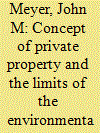

|
|
|
|
|
| Publication |
2009.
|
| Summary/Abstract |
An absolutist concept of property has the power to shape and constrain the public imagination. Libertarian theorists normatively embrace this concept. Yet its influence extends far beyond these proponents, shaping the views of an otherwise diverse array of theorists and activists. This limits the ability of environmentalists, among others, to respond coherently to challenges from property rights advocates in the U.S. I sketch an alternative concept-rooted in practice-that understands private property as necessarily embedded in social and ecological relations, rather than constrained by these relations. I argue that this concept can prefigure a more robust environmentalism.
|
|
|
|
|
|
|
|
|
|
|
|
|
|
|
|
| 4 |
ID:
085893
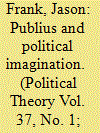

|
|
|
|
|
| Publication |
2009.
|
| Summary/Abstract |
The Federalist is commonly read as an exemplar of political realism. However, alongside Publius' arguments against the enthusiastic imagination- its tendency to inflame the passions, betray the intellect, and subvert political authority-are formative appeals to the imagination's role in reconstituting the public authority shaken during the postrevolutionary years. This essay explores three central aspects of Publius' restorative appeal to the imagination: the appeal to the public veneration required for sustaining political authority across time; the strategies for shifting citizen loyalty from the state and local level to that of a newly energized federal government; and the rhetorical elicitation of the public's imagination in aestheticized portrayals of Providential nationality. These aspects of Publius' argument make up the core of The Federalist's aesthetics of (self) rule. In each instance, Publius invokes the imagination as a heteronomic support to navigate familiar dilemmas of democratic self-authorization.
|
|
|
|
|
|
|
|
|
|
|
|
|
|
|
|
| 5 |
ID:
085895


|
|
|
|
|
| Publication |
2009.
|
| Summary/Abstract |
Schumpeter's redefinition of representative democracy as merely leadership competition was canonical in postwar political science. Schumpeter denies that individual will, common will, or common good are essential to democracy, but he, and anyone, I contend, is forced to assume these conditions in the course of denying them. Democracy is only a method, of no intrinsic value, its sole function to select leaders, according to Schumpeter. Leaders impose their views, and are not controlled by voters, and this is as it should be, he says. I respond that his leadership democracy is implausible, both descriptively and prescriptively. Competitive election is a necessary, but not a sufficient condition of democracy, not sufficient even for the limited empirical purpose of regime classification. Any adequate definition of democracy must make reference to the common will, the common good, and other values, I submit.
|
|
|
|
|
|
|
|
|
|
|
|
|
|
|
|
| 6 |
ID:
085901
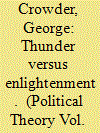

|
|
|
|
|
| Publication |
2009.
|
| Summary/Abstract |
I thank David Thunder for his stimulating comments.I agree with
him that the issues debated here are important for public policy, but I don't accept that he has presented anjy good reason to reject my case for Enlightenment or autonomy-based liberalism, Thunder makes two main claims:first, that a meaningful right of exit needn't commit us to individual autonomy in the strong Enlightenment sense;second, that value pluralism doesn't generate such a commitment either.
|
|
|
|
|
|
|
|
|
|
|
|
|
|
|
|
| 7 |
ID:
085898


|
|
|
|
|
| Publication |
2009.
|
| Summary/Abstract |
In 'Two Concept of Liberal Pluralism," George Crowder pits William Galston's " pro-toleration" liberalism against his own "autonomy-based" liberalism, and argues for the philosophical and moral superiority of the latter.
|
|
|
|
|
|
|
|
|
|
|
|
|
|
|
|
|
|
|
|
|